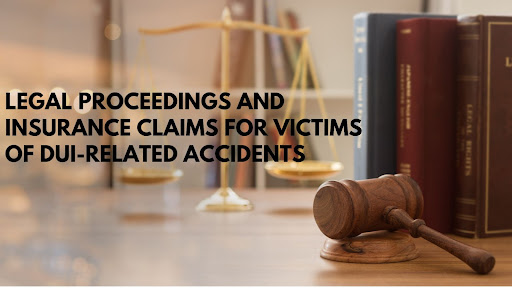Drunk driving is a serious problem that causes thousands of deaths and injuries each year. If you or a loved one have been involved in a DUI-related accident, it’s crucial to understand your legal rights and options.
This article will provide an overview of the legal proceedings and insurance claims available to victims of DUI-related accidents.
We’ll cover the legal process, the types of damages that victims can recover through legal action, and the insurance coverage that can apply to such accidents.
We’ll also discuss the challenges and considerations that victims may face and provide tips for navigating the legal and insurance systems effectively.
By seeking legal and insurance assistance, victims can ensure that they receive fair compensation for their losses and focus on their recovery.
Legal Proceedings For Victims Of DUI-Related Accidents: How To Pursue Compensation After Being Hit By A Drunk Driver
If a drunk motorist struck you, you may be entitled to compensation for your losses and injuries under the law.
Pursuing legal action against a drunk driver can be a complex process, but it’s essential to ensure that you receive fair compensation for your damages. Here are some steps you can take to pursue legal action after being hit by a drunk driver:
Seek Medical Attention
If you’ve been hit by a drunk driver, your first priority should be to seek medical attention. Even if you don’t feel injured at the time, some injuries may not become apparent until later.
Getting medical treatment immediately after the accident will also create a record of your injuries, which can be important evidence in your legal case.
Hire A Competent Attorney
Working with an experienced attorney who specializes in DUI-related accidents can help ensure that you receive the maximum compensation for your injuries and losses.
Your attorney will help you gather evidence, negotiate with the other party, and file your lawsuit if necessary.
File A Claim
Depending on the circumstances of your accident, you may be able to file a claim with the drunk driver’s insurance company. Your attorney can help you navigate this process and ensure that you receive fair compensation for your damages.
Recover Damages
Through legal action, victims of DUI-related accidents can recover various types of damages, such as medical expenses, lost wages, pain and suffering, and property damage.
Your attorney will help you determine the types of damages you are eligible to recover and fight for fair compensation on your behalf.
It’s important to remember that pursuing legal action after being hit by a drunk driver can be a time-consuming and emotionally challenging process.
However, by working with an experienced attorney and seeking compensation for your damages, you can hold the responsible party accountable for their actions and ensure that you receive the support you need to recover.
Insurance Claims for Victims of DUI-Related Accidents: Factors to Consider When Pursuing Compensation
Victims of DUI-related accidents may also be able to recover compensation through insurance claims. Here are some factors to consider when filing an insurance claim after a DUI-related accident:
Understand Your Coverage
Depending on your insurance policy and the circumstances of your accident, you may be able to file a claim with your own insurance company, the other driver’s insurance company, or both.
It’s important to understand your insurance coverage and the types of damages that are covered.
Gather Evidence
As with legal proceedings, gathering evidence is essential for filing an insurance claim. Take photos of the accident scene, collect witness statements, and obtain a police report.
This evidence will help support your insurance claim and demonstrate the extent of your damages.
Notify Your Insurance Company
After the collision, you should contact your insurance provider as quickly as you can. Even if you are filing a claim with the other driver’s insurance company, you should still inform your own insurance company of the accident.
Work With An Attorney
While hiring an attorney is not always necessary for insurance claims, it can be helpful in complex cases or cases where you are facing resistance from the insurance company.
An attorney can help you navigate the insurance claim process, negotiate with the insurance company, and ensure that you receive fair compensation for your damages.
Cooperate With The Insurance Company
To ensure that your insurance claim is successful, you should cooperate fully with the insurance company. This means providing all requested documentation and answering any questions truthfully and accurately.
It’s important to note that insurance claims for DUI-related accidents can also be challenging, and victims may face resistance from the insurance company.
However, by understanding your insurance coverage, gathering evidence, and working with an experienced attorney, you can increase your chances of receiving fair compensation for your damages.
An Oakland car accident lawyer shares: “In a broader context, it is incumbent upon society to continue raising awareness about the perils of drunk driving and advocating for stricter measures to prevent such accidents from occurring in the first place. Ultimately, through collective efforts, we can work towards reducing the devastating impact of DUI-related accidents on individuals and families.”
Challenges And Considerations For Victims Of DUI-Related Accidents
Victims of DUI-related accidents may face a number of challenges and considerations when pursuing legal and insurance claims. Here are some things to remember:
Comparative Negligence
In some states, victims of DUI-related accidents may be found partially at fault for the accident if they were also under the influence of drugs or alcohol at the time.
This is known as comparative negligence and can impact the amount of compensation a victim can receive.
Statute Of Limitations
Victims of DUI-related accidents typically have a limited amount of time to file legal and insurance claims. The statute of limitations on this differs from state to state.
It’s important to understand the statute of limitations in your state and take action as soon as possible after the accident.
Insurance Company Resistance
As mentioned earlier, insurance companies may resist paying out compensation for DUI-related accidents.
They may dispute the extent of damages, argue that the victim was partially at fault for the accident, or claim that the accident was not covered under the policy. Victims should be prepared to fight for fair compensation and work with an attorney if necessary.
Emotional And Physical Trauma
DUI-related accidents can be emotionally and physically traumatic for victims. In addition to physical injuries, victims may experience anxiety, depression, PTSD, and other mental health issues.
It’s important for victims to seek medical and emotional support during the recovery process.
Impact On Future Opportunities
DUI-related accidents can have long-lasting consequences for victims. In addition to physical and emotional trauma, victims may face financial difficulties, loss of employment, and damage to their reputations.
It’s important for victims to consider the potential long-term impact of the accident and seek compensation that reflects these future consequences.
Overall, victims of DUI-related accidents face a number of challenges and considerations when pursuing legal and insurance claims.
By understanding these factors and working with an experienced attorney, victims can increase their chances of receiving fair compensation for their damages.
Bottom Line
Being hit by a drunk driver can be a traumatic experience for victims and their families. It can result in physical, emotional, and financial damages that can be difficult to recover from.
However, victims of DUI-related accidents have legal and insurance options available to them that can help them receive compensation for their losses.
Pursuing legal and insurance claims can be challenging, but it’s important for victims to understand their rights and work with experienced attorneys to navigate the process.
By doing so, victims can increase their chances of receiving fair compensation and begin to move forward with their lives.













